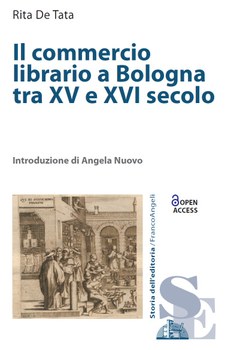- Home
- THE CENTER Apri sottomenù
- RESEARCH Apri sottomenù
- PUBLICATIONS Apri sottomenù
-
EVENTS
Apri sottomenù
- Lucretia Estensis de Borgia. Tra biografia e narrazione nelle carte dell'Archivio di Stato di Modena
- Libri e lettori nella Bologna dei papi (1506-1796)
- Pagine benedettine
- Dante e la Divina Commedia in Emilia-Romagna
- Con ogni diligenza corretto e stampato. Stampatori, librai e cartari a Faenza dal XV al XVIII secolo
- The Seasons of Scholarship and the Generations of Scholars. A European History (15th-19th Centuries)
- BIBLIOGRAPHIC RESOURCES Apri sottomenù
- AGENDA
- Contacts
- Photogallery
Il commercio librario a Bologna tra XV e XVI secolo
Rita De Tata's book launch (Milano, FrancoAngeli, 2021, open access)
-
Date: 29 JUNE 2021 from 17:30 to 19:00
-
Event location: Online (Facebook page "Il Chiostro dei Celestini")
-
Type: Book presentations

Fifteenth-century Bologna is one of the major Italian cities, home to a prestigious university and a thriving industrial and economic center; in these conditions, ideal for the development of the nascent typographic art, the market of the manuscript book, and its world of copyists, illuminators, bookbinders, stationarii, soon adapts to the new form of production, favoring the emergence of some great families of booksellers-printers-publishers. Already in the early decades of the sixteenth century, however, the increasingly overwhelming presence of foreign book production became evident: important printers such as Vincenzo Valgrisi and Gabriele Giolito established branches in the city, while the Lyonese publishing house of the Giunti was establishing itself in the legal book sector.
The situation changes again in the second half of the century, when the market reshapes itself following the conditioning operated by the ecclesiastical authorities and spreads to social strata previously excluded from cultural consumption. The work, based on a detailed investigation of documentary sources, reconstructs for the first time a social history of the Bolognese book trade, outlining the events of families and shops operating in the city, but also opening the gaze to relations with large foreign firms (Source : FrancoAngeli).
Institutional greetings
Giovanna Giubbini, director of the State Archive of Bologna
Speakers
Massimo Giansante, State Archive of Bologna
Paolo Tinti, University of Bologna
The Author will be present
Link to the event
Download the book
Invitation
Contatti
Il Chiostro dei Celestini. Amici dell’Archivio di Stato di Bologna
Bologna, vicolo Spirito Santo, 4 (presso Archivio di Stato di Bologna)